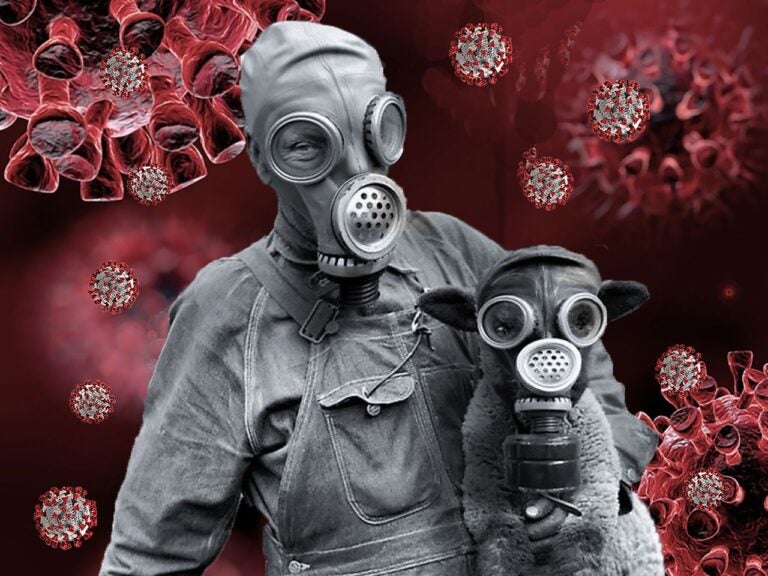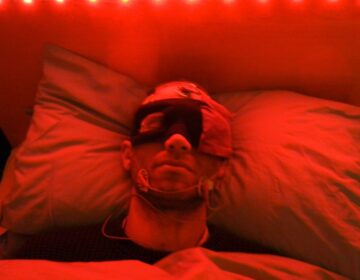Pandemic dreams
People are reporting having more vivid and bizarre dreams during the pandemic. We'll discuss what they mean and the science of dreaming.
Listen 49:44
"Strange Times" by dream researcher Deirdre Barrett of a pandemic dream she had.
Have you been having strange dreams since the coronavirus arrived? The pandemic hasn’t only disrupted our waking lives, it’s also invaded our sleep. People are reporting more vivid, complex, and bizarre dreams with fears of the virus, lockdowns and social distancing playing out in weird ways in sleeping minds. This hour, we’ll talk with two researchers about the latest science on dreaming and what our pandemic dreams and nightmares say about our state of mind. DEIRDRE BARRETT, dream researcher at Harvard Medical School and the author of Pandemic Dreams, and MARK BLAGROVE, professor of psychology and director of the Sleep Laboratory at Swansea University in Wales.

Subscribe for more Radio Times
Interview highlights
On stressful dreaming
Marty Moss-Coane: What is the connection then between stress and dreaming?
Deirdre Barrett: Well, any major personal stress or a big crisis in the world tends to stir up dreaming. There’s a pretty well validated hypothesis called the dream consistency hypothesis that says that dreams are basically on the same topics as our waking concerns. And that’s been pretty well shown in a lot of studies. So when our waking concerns get more anxious, so does our dream life.
MMC: Is it important for us to have these dreams? Are we discharging the emotions that we’re feeling during the day?
Mark Blagrove: Well, we’re certainly dreaming of the emotions that we have during the day. And that’s been found in many studies that what’s emotionally in the day we’re more likely to dream of than the less emotional things. And there’s lots of work done on sleep and memory processing, sleep and emotions. But whether or not the dreams, even though they’re emotional, are part of that emotion processing is another question.
On dreaming in metaphors
MMC: And when we talk about dreams, they are in some ways metaphors. Sometimes they’re you know, they’re not metaphor. Is it important, Mark, to understand that we do dream in kind of clues and symbols and metaphors?
MB: Yes. The idea that we have metaphors in our dreams is a very long standing one and is now part of very standard cognitive science and neuroscience, that we can depict the waking world in a metaphorical way. Much as when we talk about the waking world. When we’re awake, we often can talk about it in a metaphorical way. You know, you can talk about a person you’re in love with. You can say, look how far we’ve come and we’ve gone onto a bumpy stretch or we must go our separate ways. You know, all these are metaphorical ways of talking. And we have vast numbers of them when we’re awake. But when we dream, we then tend to see the metaphors and we’re part of the environment in which there is a metaphor. So it’s almost as if you’re living in the metaphor when we are dreaming.
On how to sleep more peacefully
MMC: Are there ways to have less stressful dreams? I mean, we are living in stressful times, but is there a way to sort of mitigate that or somehow reduce the kind of stress we might feel when we are asleep and dreaming?
DB: The simplest technique that one can describe in a minute is to think of what you would like to dream about, maybe just a favorite person or a place you’d like to be visiting, or some people like flying dreams. But just whatever your ideal dream would be, to fall asleep telling yourself, ‘I want to dream about X, I want to dream about X.’ And then form a vivid visual image of something as simple as the person’s face or the place. Because our dreams are so visual, that often helps get the request through.
WHYY is your source for fact-based, in-depth journalism and information. As a nonprofit organization, we rely on financial support from readers like you. Please give today.





